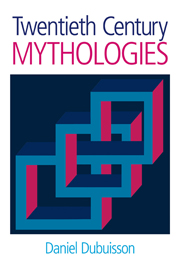Book contents
- Frontmatter
- Epigraph
- Contents
- Foreword by Professor Robert A. Segal
- Preface
- Abbreviations
- Introduction: History and comparative epistemology
- Part I Georges Dumézil, or Society
- Part II Claude Lévi-Strauss, or the Mind
- Part III Mircea Eliade, or the Sacred
- 12 Fascism and mysticism
- 13 Primitive ontology
- 14 The eternal return of anti-Semitism
- 15 The neo-paganism of homo religiosus
- 16 Metaphysics and politics: Eliade and Heidegger
- Addendum III Esotericism and fascism
- Addendum IV The reconstruction of prehistoric religions
- Addendum V The Eliadean conception of symbolism
- Addendum VI Forgetting the Shoah
- Conclusion: Modern theories of myth and the history of Western thought
- Bibliography
- Index
13 - Primitive ontology
from Part III - Mircea Eliade, or the Sacred
- Frontmatter
- Epigraph
- Contents
- Foreword by Professor Robert A. Segal
- Preface
- Abbreviations
- Introduction: History and comparative epistemology
- Part I Georges Dumézil, or Society
- Part II Claude Lévi-Strauss, or the Mind
- Part III Mircea Eliade, or the Sacred
- 12 Fascism and mysticism
- 13 Primitive ontology
- 14 The eternal return of anti-Semitism
- 15 The neo-paganism of homo religiosus
- 16 Metaphysics and politics: Eliade and Heidegger
- Addendum III Esotericism and fascism
- Addendum IV The reconstruction of prehistoric religions
- Addendum V The Eliadean conception of symbolism
- Addendum VI Forgetting the Shoah
- Conclusion: Modern theories of myth and the history of Western thought
- Bibliography
- Index
Summary
We must never expect from Eliade a minute treatment of sources or a detailed presentation of ideas. For him, vague, superficial resemblances are enough, suggested here and there by his summary interpretations. He is ever repeating himself, content with illustrating his intuitions by a few evocative images from his exotic albums, but he never analyses. His work, prolific as it was, produced no new concept and elucidated nothing. If the thought of Lévi-Strauss is difficult, austere, laboured, and a magnificent challenge to the wisdom of the reader, the crude convictions of Eliade seem to expect the reader to be naive, capable of being amazed by lyrical incantations and facile prodigies of erudition. Although they demonstrate vast reading, Eliade's works are nonetheless irritating. Metaphysical thesis always precedes demonstration, which is reduced to its most expeditious, that is, the accumulation of partial witnesses and arbitrary comparisons. He gives the constant impression of having read too quickly, impatient to add a new field to his antique territory. His reflection seems to proceed from a brisk sweepinga-way of data, from which he retains merely the odd superficial detail.
The interest presented by Eliade's thought, then, does not arise from his theoretical daring, from the originality of his method, or indeed from his conceptual profundity. It comes, rather, from its exemplary character, for we find in it a condensation of all the faults and abuses belonging to those mystical processes that claim scientific value.
- Type
- Chapter
- Information
- Twentieth Century Mythologies , pp. 189 - 208Publisher: Acumen PublishingPrint publication year: 2006

